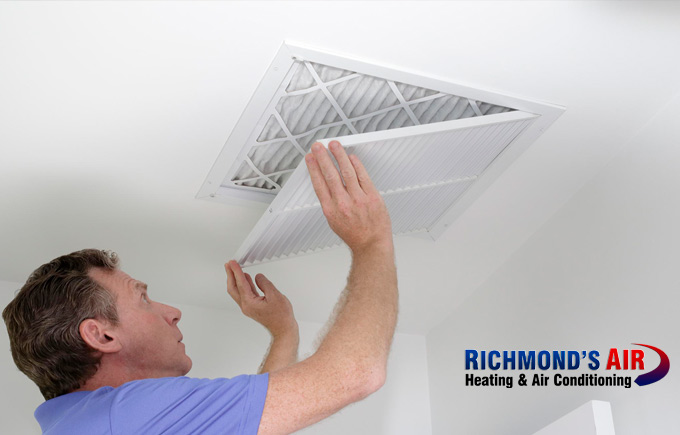Updated: February 12, 2025

Each day, a Richmond’s Air HVAC technician may visit a half-dozen residential clients in Houston in an effort to repair or tune up an air conditioning unit or furnace. Sometimes, our techs encounter a relatively easy fix, and other times, they face more complex issues that require in-depth troubleshooting and expertise.
There are numerous career opportunities available for those trained in HVAC. The specific job requirements for an HVAC technician can vary based on location, employer, and experience, but this article aims to provide an overview of what a typical day in the life of an HVAC technician looks like.
If you’re considering a career in HVAC, here are some key factors to help you determine if pursuing vocational training in this field is the right choice for you.
What is a typical day as an HVAC technician?
An HVAC technician’s work schedule can differ based on their type of employment. If you work for a Houston company specializing in HVAC repair, your day could begin at any time, as temperature control systems can malfunction unexpectedly and need prompt attention to ensure people’s comfort, health, and safety.
Conversely, if you’re employed by a construction or home building company focused solely on installing air conditioning units, you can generally expect a more predictable schedule, with work typically being done during standard business hours.
HVAC technicians usually begin their day by arriving at their workplace to review their tasks for the day. Some jobs may be straightforward and quick, while others could be more complex and time-consuming.
Once the technician has identified the day’s appointments, they will gather the necessary HVAC tools and safety equipment before heading to the job sites.
How many appointments do HVAC technicians handle in a day?
The number of appointments a technician handles each day will vary based on the nature of the tasks. For example, installing an HVAC unit at a business can take most of the day and typically requires collaboration with several colleagues.
In contrast, you might have a series of shorter tasks, such as repairing an HVAC system in a home or performing routine maintenance on a refrigeration unit at a small business.
Top 10 Questions to Ask Your HVAC Contractor
Make sure to ask an HVAC contractor these important questions before hiring them to fix your home’s heating or cooling system.
What are the benefits of being an HVAC technician?
There are several reasons why being an HVAC tech is a good career move. Longtime industry members say they do have the occasional “bad day,” but overall, it’s a positive experience with new things to learn and people to meet, which keeps the job interesting.
Below are some of the benefits of being an HVAC tech:
- Good pay and job prospects. One of the key advantages of a career in HVAC is the competitive pay and positive job outlook. On average, HVAC technicians earn around $27.55 per hour, translating to approximately $57,300 per year. This figure can increase with additional experience. The job outlook for HVAC technicians is promising, with the Bureau of Labor Statistics (BLS) reporting that employment is expected to grow by 6% from 2022 to 2032. This rising demand is likely to drive up salaries in the field as well.
- Work almost anywhere. A major advantage of working in the HVAC industry is the widespread availability of jobs, both across Texas and the U.S. As modern living and working spaces increasingly require climate control, there is a constant demand for HVAC services in virtually any area of the globe with residential and commercial buildings.
- Wide variety of employers. HVAC companies vary greatly in size, from small, family-run businesses with just a few employees to large corporations with thousands on staff. You can choose to work for a company that specializes in residential HVAC, commercial HVAC, or a combination of both. This diversity allows you to select a work environment that suits your preferences and provides the flexibility to switch to a different type of company if your interests or career goals change.
- Variety of job duties. HVAC technician work is primarily hands-on and varies daily. Each project presents unique challenges, requiring technicians to think creatively and find new solutions. This dynamic nature of the job keeps it engaging and provides continuous learning opportunities with each new assignment.
- No college required. One significant advantage of pursuing a career in HVAC is that it doesn’t require a college degree. This enables you to start earning money sooner and avoid the substantial student debt that many college graduates face.
- Usually receive benefits. Another compelling reason to work in the HVAC industry is that many HVAC companies offer comprehensive benefits packages. These often include medical, vision, and dental insurance, as well as life insurance and options to participate in a 401(k) plan. Such benefits not only support you but also provide valuable coverage for your family, helping with both anticipated and unexpected expenses.
- Ability to start your own company. Starting your own HVAC company is relatively straightforward. With sufficient experience to handle jobs independently, you can then focus on meeting the regulatory requirements for your location. Once you’ve fulfilled these requirements, you’ll be ready to launch your business.
HVAC History: How AC Evolved Throughout the Decades
Ever since its creation, the HVAC unit has seen continuous changes and technological upgrades throughout the decades.
What are the cons of working HVAC?
So, what are some of the cons of working as an HVAC tech? As with any job, there are a few, including:
- Long hours during the “busy season.” The peak season for HVAC technicians is typically summer, which means long days of hands-on work during the hottest period of the year. If you’re in a location like Houston, this can mean enduring sweltering heat as you work to keep clients’ systems running smoothly.
- Physically demanding. Being an HVAC technician is physically demanding, as it involves hands-on work in various environments. Much of the work takes place on rooftops or in attic spaces where the temperature is often unconditioned. While some may find this aspect of the job appealing, others might prefer a more comfortable work setting, such as a desk job in a climate-controlled office.
- Might be “on-call” at times. Working in the HVAC industry often involves being on call. Since many people rely on home HVAC systems, you may need to respond to issues that arise outside of regular work hours. This could mean being called away from family or friends at inconvenient times.
- Takes time to learn. While many HVAC companies do offer paid training, it’s important to note that you’ll typically make less money until you’re fully trained. HVAC training is also comprehensive and time-consuming, which means it can take some time before you’re able to earn a full salary.
- Safety hazards. Another downside of working as an HVAC technician is the safety hazards associated with the job. These risks include handling high-voltage equipment, working with hazardous refrigerants, and performing tasks at heights. Although the job does come with inherent dangers, adhering to safety protocols and following your training can significantly reduce the risk of injury.
- Certifications can be expensive. Obtaining additional HVAC certifications is a valuable way to advance in the industry. However, many companies require you to cover the cost of these certifications yourself. While this expense may be a financial burden in the short term, the enhanced qualifications can lead to higher earnings in the future, helping to offset the initial costs.
- Often work alone. Another drawback of working as an HVAC technician is that you may often work alone. Many tasks in this field are designed to be handled by a single person, leading to extended periods of isolation. While some individuals may appreciate the solitude, others might find it monotonous and lonely.
Looking for the best HVAC technicians in Houston?
Whether you need a simple furnace repair, a new HVAC system, or a whole-house humidifier installation, the dedicated team at Richmond’s Air is committed to providing top-notch services in Houston to ensure your home stays comfortable year-round.
No matter the challenge, our licensed and insured technicians approach every job with the same level of care and professionalism, ensuring that our clients receive the best possible solutions for their heating and cooling needs.
 Read reviews
Read reviews










